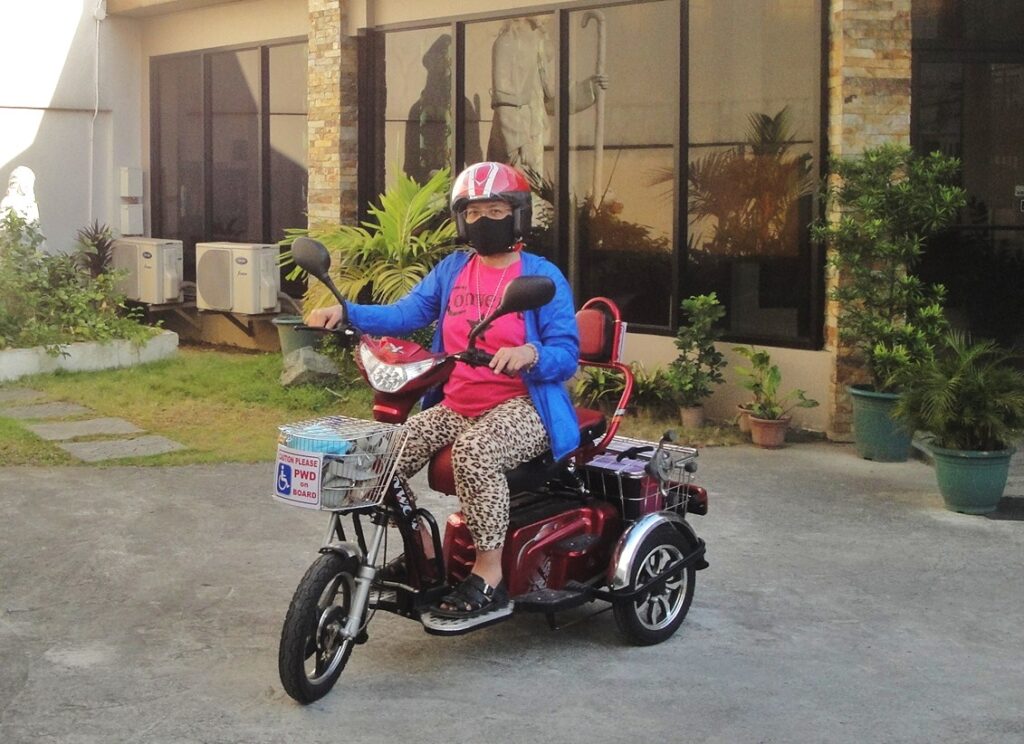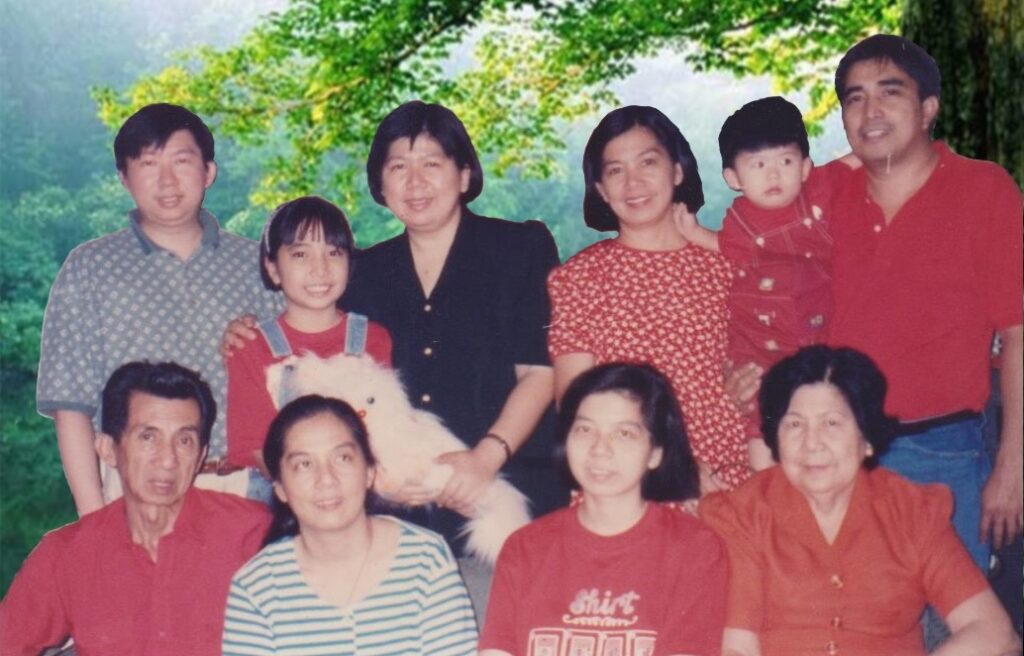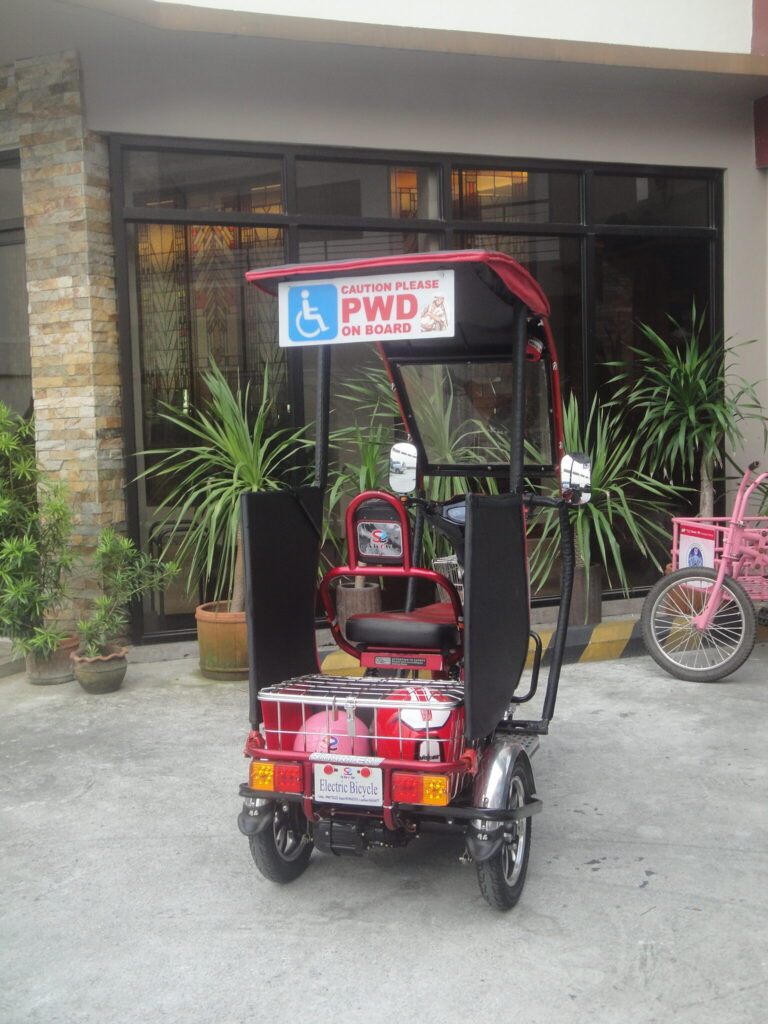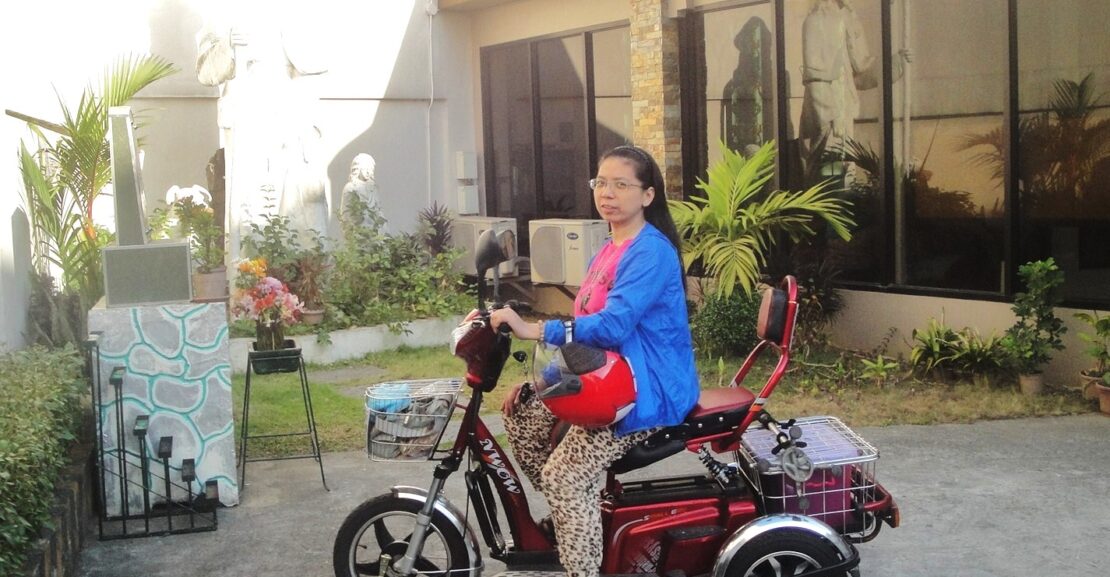The road has never been easy for fifty-six-year-old Luisa Dela Cruz. As a person with a disability (PWD), she faces countless obstacles navigating the bustling streets of Metro Manila as a commuter. From inaccessible public transportation and poor infrastructure to safety concerns and gridlocked traffic, every commute feels like an uphill battle. And in a city where 16 million people hustle from place to place daily, being a PWD commuter only adds to the ordeal.
Although Batas Pambansa 344 (Accessibility Law) was introduced to uphold the rights and welfare of PWDs—through pedestrian crossings, ramps and elevators, parking spaces, and accessible restrooms—it hasn’t eliminated the daily struggles of the 1.9 million persons with disabilities who rely heavily on public transportation.

This challenge led Luisa to embark on a new journey with an electric three-wheeler, powered by a 60V 22AH battery, capable of reaching a maximum speed of 35 kilometers per hour.
The Woman Behind the Wheels
Luisa is an accomplished woman with a heart devoted to service. A graduate of B.S. Fine Arts from Philippine Women’s University and B.S. Architecture from Rizal Technological University, she became a licensed architect and worked in a construction company before answering a higher calling in 2005—devoting herself to full-time service in a Charismatic community. She dedicated her life to ministry, sharing her faith through social media, inspirational messages, and public speaking.

She currently works part-time at a school in Pasig City, contributing to administrative tasks and illustrating preschool books. Beyond work and service, Luisa finds fulfillment in her personal passions—crafting, painting, and writing. These pursuits, along with her deep faith, shape her life.
Yet, her journey has not been easy. Living with polio since the age of two, she has faced countless physical, emotional, and societal challenges. She still remembers her childhood struggles—where commuting to school felt like an endurance test. As if that weren’t enough, her classmates’ taunts made life even harder. They called her “Pilay”—a Filipino term for a person with a physical disability—a memory she’d rather leave in the past.
Thankfully, her parents did everything to help her. They provided her with mobility aids, from metal-supported braces to a cane. But even these solutions came with their own challenges—physical discomfort, frequent repairs, and the emotional weight of feeling different.
Luisa narrates that before e-bike entered her life, she was totally exhausted from her daily routine. Walking long distances was so painful, and public transport was far from accommodating. She remembers waiting hopelessly at Jeepney stops, only to be ignored by drivers who saw her conditions. But with the unwavering support of her family, friends, and community, Luisa continues to push forward, redefining independence on her own terms.
“Wheelchair on Streets”
Long before electric bikes became widespread on the streets and in subdivisions, Luisa was already navigating the streets using her e-bike as her primary mode of transport. She recalls how this simple yet powerful machine became her lifeline, a practical and cost-effective alternative to Metro Manila’s unforgiving public transport system.
In 2015, she made a life-changing decision—she purchased her first electric three-wheeler. It was her brother-in-law who encouraged her to take the leap. Though she initially had concerns about safety and reliability, she didn’t hesitate for long. She saw a way out—a way to end the exhaustion and frustration of daily commuting.

Her new e-bike, custom-built with a roof for rainy-day travel, became her most trusted companion. With it, she could commute to work, attend church, and run daily family errands—all without the constant struggle of waiting for jeepneys, MRT/LRT trains, or taxis that often refused her service.
For the first time in her life, she could move on her own terms. No more standing in endless lines. No more rejections from public transport drivers. No more exhausting walks under scorching sun or rainy weather. Her e-bike—which she fondly calls her “Wheelchair on the Street”—was nothing short of a heaven-sent gift. Now, with just 6 to 8 hours of charging, she can go anywhere, anytime—a freedom she never thought possible.
The Challenges of PWDs in Commuting
For the past five decades, Luisa has been navigating a world designed for the able-bodied. She still remembers her childhood struggles—where commuting to school felt like an endurance test. As if that weren’t enough, her classmates’ taunts made life even harder. They called her “Pilay”—a Filipino term for a person with a physical disability—a memory she’d rather leave in the past.
Thankfully, her parents did everything to help her. They provided her with mobility aids, from metal-supported braces to a cane. But even these solutions came with their own challenges—physical discomfort, frequent repairs, and the emotional weight of feeling different.
Luisa narrates that before e-bike entered her life, she was totally exhausted from her daily routine. Walking long distances was so painful, and public transport was far from accommodating. She remembers waiting hopelessly at Jeepney stops, only to be ignored by drivers who saw her conditions.
Is the E-bike safe on the streets?
According to data from the Metro Manila Development Authority (MMDA), over 500 e-bike-related accidents were recorded in Metro Manila in 2023 alone. Many of these accidents involved unregistered e-bikes and riders who failed to wear helmets or proper safety gear.
The Land Transportation Office (LTO) has also reported a 40-percent increase in e-bike-related accidents from 2023, particularly in high-traffic areas such as EDSA and Commonwealth Avenue. Many of the accidents have been linked to lack of awareness about traffic laws. Some riders assume that because e-bikes are smaller and slower than motorcycles, they are not subject to the same regulations. However, without proper traffic knowledge and safety precautions, both riders and pedestrians remain at risk.
In response to the increasing safety risks, the Philippine government has started implementing stricter regulations on e-bike use. The House of Representatives has introduced legislative measures, such as House Bill No. 10270, which proposes the creation of dedicated e-bike lanes and the stricter enforcement of traffic laws for e-bike riders.
Some local government units (LGUs), such as Quezon City and Makati, have also taken the lead in requiring e-bike registration and conducting safety seminars for riders. These initiatives aim to ensure that e-bike users understand traffic rules and operate their vehicles responsibly.
Meanwhile, President Ferdinand Marcos Jr. has also expressed his support for the e-bikes as an alternative sustainable transport options. However, he has emphasized the need for stricter enforcement of road laws to ensure that safety is not compromised in the pursuit of convenience. As part of his “Build Better More” infrastructure program, there are ongoing plans to expand bike lanes and improve PWD-friendly roads, creating safer spaces for e-bike riders and pedestrians alike.
Future of the PWD commuters
Luisa has witnessed a slow but promising shift in society’s treatment of person with a disability (PWDs). Unlike before, awareness is growing, and more public spaces now offer ramps, and priority lanes. But there’s still a long way to go.
She dreams of a society that fully embraces inclusion, where accessibility is not an option. She takes inspiration from global stories of PWD entrepreneurs who have built successful businesses and supported others with disabilities. She hopes that one day, similar opportunities will be widely available in the Philippines.
Despite the remaining challenges, Luisa chooses to focus on the positivity rather than the setbacks. She believes in the power of small changes leading to greater transformation, and she remains hopeful that the future is bright for the persons with disabilities—especially when it comes to commuting.
Lessons from the Road
Luisa’s journey has been anything but easy, yet through every challenge, she has gained wisdom and resilience—lessons she hopes will inspire others, both PWDs and non-PWDs alike, to face life’s struggles with courage and faith. She firmly believes that hardships are inevitable, but it is our attitude and perspective that shape how we overcome them.
One of the greatest lessons she has learned is that obstacles are part of the journey. Instead of letting difficulties define her, Luisa chooses to face them head-on—with determination and unwavering faith.
She has also come to understand that blessings often hide in life’s toughest moments. There were times when she wondered why her path was filled with so many struggles, yet over time, she realized that even in suffering, there are reasons to be grateful. Whether it’s the kindness of a stranger, the unwavering support of loved ones, or simply the strength to keep moving forward, there is always something to appreciate.
Attitude of Gratitude
When asked if she has any regrets, Luisa simply smiles. “I have none,” she says. “God has taught me to accept everything that comes, even the challenges. There are always blessings in disguise.”
Her disability, once a source of struggle, has become a testament to her strength. She sees how God has used her journey to inspire kindness in others—whether it’s a stranger offering help or friends supporting her in difficult times.
Luisa’s life on three wheels is not just about mobility—it is about faith, perseverance, and purpose. She is proof that independence isn’t defined by the ability to walk freely but by the courage to move forward, despite the odds.
As she continues to navigate the streets of Metro Manila and the roads of life, one thing is certain: Luisa is not just a passenger in her story—she is the driver, steering toward a future full of hope, possibility, and grace.

